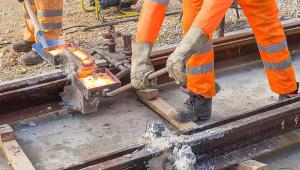By Richard Johnstone | 6 November 2014
Deputy Prime Minister Nick Clegg has set a target for the trans-Pennine rail line to be electrified by 2025 as part of plans to boost connectivity between cities in the North of England.
Speaking at today’s Northern Futures Summit in Leeds, Clegg said that the more than 25 million people who use the existing cross-Pennine rail routes had to put up with ‘dilapidated’ lines.
‘One of the key things that comes up time and again is the need for better transport links – electrification for the rail networks connecting Leeds, Sheffield and Manchester,’ he said.
‘That is why I am pushing for a huge programme of transport improvements in the North to begin immediately.’
Work is already underway to electrify the line between Liverpool and Manchester, which should be completed later this year.
Funding has also been announced to electrify the North trans-Pennine route from Manchester to Leeds, with Network Rail currently undertaking work to determine which structures need to be modified for electrification. This is set to be completed by December 2018.
However, Clegg said that by 2025 he wanted the entire network, including cities such as Leeds, Sheffield, Newcastle and Hull, to be running under wires.
‘The North needs improved transport now,’ he said. ‘The roads and railway lines connecting our great northern cities have seen improvements in recent years, but I want more. Much more.
‘As we negotiate over what gets government funding in the Autumn Statement, one of my key priorities will be to change that. We need to get this started as soon as possible. I want a fully upgraded and electrified network between Manchester, Leeds and Sheffield by 2025.’
Clegg also said that he wanted government money to be made available to improve the rolling stock on the lines, where some Pacer trains are more than 30 years old.
These are not fit for a 21st century metropolis, he said.
‘Decrepit trains such as the Pacers, which are literally ancient buses on rails, are not a fair way for people in the North to get to and from work. They would not be deemed acceptable on London commuter lines, and they are not acceptable in the North.’
This is the latest plan for Northern transport improvements, and comes after publication of the One North report in August by six cities in the region.





















